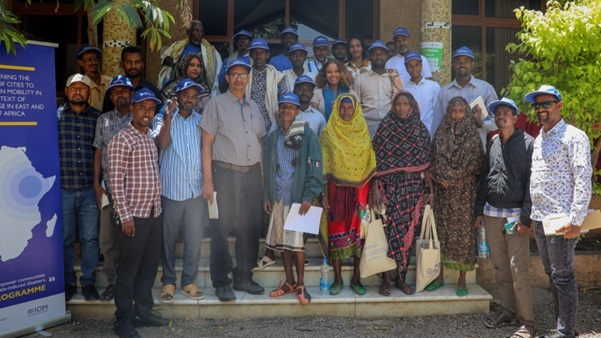
AWASH, Ethiopia (IOM Ethiopia) – On February 28, the International Organization for Migration (IOM) in Ethiopia launched a pilot Migration, Environment, and Climate Change (MECC) project in Awash City, Afar Region, in the presence of federal, regional, local administration officials.
The project, “Strengthening the Capacities of Cities to Manage Human Mobility in the Context of Climate Change in East and Horn of Africa” is under pilot in Ethiopia and Burundi. In Ethiopia, this initiative will respond to recurrent climate-induced disasters, which has been a cause of displacement affecting a significant number of communities in different parts of the country.
Over 3,500 individuals continuously displaced by recurrent seasonal and flash floods and rivers bursting their banks in Afar are expected to benefit from the project. Collaborating with various local administrations and community members, this initiative aims to enhance the capacity of local governments and stakeholders to effectively manage human mobility in the face of climate change and build the resilience of affected communities through community-based climate adaptation activities.
Through this project a study on disaster-induced mobility will also be conducted in selected cities and a toolbox developed to help policymakers and local authorities integrate human mobility and climate change into local planning. A community-based climate-resilient project will also be initiated in Afar.
Over 23,182 individuals have been displaced because of flooding in twenty-three sites in Afar region, according to the latest Ethiopia National Displacement Report released by IOM’s Displacement Tracking Matrix (DTM) in December 2023.
Additionally, the region is also vulnerable to drought. In 2021, over 175,000 individuals were affected, and by 2023 this number had increased to more than 590,000, according to the regional Disaster and Risk Management Office.
“Communities recurrently displaced by floods face both humanitarian and development challenges, placing a strain on local administrations’ capacity to adapt. This initiative aims to address these issues by prioritizing the needs of impacted communities and implementing sustainable solutions,” said Kidist Mulugeta, MECC Programme Officer for IOM Ethiopia.
The communities in the project target area, Awash Fentale district, rely on nearby rivers for water, livestock pasture and farming. However, recurrent flooding, stemming from river overflow during the rainy season and flash flooding incidents due to seasonal rainfall, is forcing households to relocate to the nearest cities in search of shelter and necessities. Some are temporarily sheltered in the vicinity of a nearby sugar factory.
“Due to the frequent flooding, we are continually forced to relocate, losing of our livelihoods and assets,” said Walu Ahado Deta, community representative for Kebena Kebele. The project, which is supported by the IOM Development Fund, was launched after consulting relevant government stakeholders and impacted communities on the patterns of human mobility, the environment, and climate change in Awash City in Awash Fentale district.
Source: IOM Ethiopia
